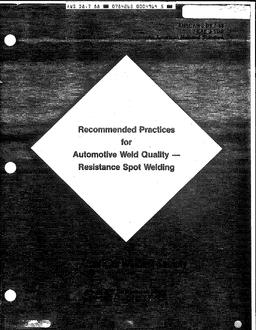These recommended practices encompass those procedures that should be followed in the design, manufacture, and inspection of brazed joints for critical components in order to assure their reliability in service.
The procedures recommended represent the best current practice and are necessary to the control of brazed joint quality. These practices are applicable to all products and brazing processes. Whenever any or some of these practices are omitted when producing critical components, the omission should be the result of a rational decision, not the result of a lack of knowledge of the best practice.
This document is divided into sections addressing materials, design, manufacturing, and inspection. These sections are followed by Annex A, which presents sample specifications that are intended as guides for the preparation of the user’s documents; Annex B, which presents a discussion of brazing risk management; Annex C, which presents a table relating to the quantification of the scope and magnitude of braze-induced discontinuities; and Annex D, which presents guidelines for the preparation in inquiries for AWS technical committees.
Procedures for the protection of the safety and health of those performing brazing and related operations are of great importance. Among the potential hazards to be considered are exposure to fumes and gases, radiation, and toxic materials. However, safety and health considerations are not addressed in this standard. The user is advised to consult (1) the manufacturer’s instructions and Material Safety Data Sheets (MSDSs) for the material and equipment used and (2) federal, state, and local regulations. Additional information on safety and health is included in ANSI Z49.1, Safety in Welding, Cutting, and Allied Processes, and Chapter 10, “Safety and Health,” of the American Welding Society’s (AWS) Brazing Handbook.





